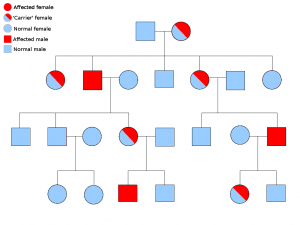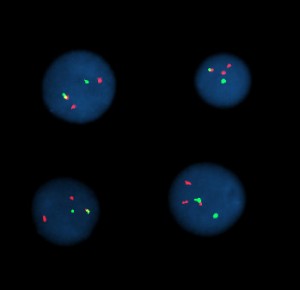Most genetic counsellors have an undergraduate degree in biology, genetics, psychology, nursing, social work, or public health. Graduate programs in Genetic Counselling vary upon which degrees they accept, so be sure to check before applying.
While it varies from program to program, most genetic counselling graduate programs identify the following courses as prerequisites:
* NOTE: The specific course titles/numbers listed below are applicable to undergraduate students at the University of Alberta (Edmonton, Alberta, Canada) ONLY and are considered to be the appropriate prerequisite equivalents, as of December 2012.
Required Prerequisite Courses for many Genetic Counselling Graduate Programs:
- Biology (molecular and cell): one year
- BIOL 107, BIOL 201 or CELL 201
- Chemistry: one year
- CHEM 101, CHEM 102
- Organic Chemistry: one semester
- CHEM 261
- Genetics (Mendelian and molecular): one semester
- BIOL 207
- Human Genetics: one semester
- GENET 418
- Biochemistry: one semester
- BIOCH 200
- Psychology (introductory): one semester
- PSYCO 104
- Statistics and Probability: one semester
- STAT 141 or STAT 151
Recommended Prerequisite Courses for many Genetic Counselling Graduate Programs:
- Higher-level Genetics: GENET 270, GENET 275, GENET 302, BIOL 380, BIOL 490
- Anatomy/Physiology: ANAT 200, PHYSL 210/212/214
- Embryology/Developmental Biology: ANAT 400, ZOOL 303
- Abnormal Psychology: PSYCO 239
- Personality Psychology: PSYCO 233
- Social Psychology: PSYCO 241
- Calculus: MATH 113/114
- Bioethics/Philosophy: PHIL 386, CHRTC 352
Additionally, admissions committees are looking for applicants with previous exposure to genetic counselling and other closely-related areas. These applicants tend to have a better understanding of the field and the expectations of the profession. Before applying to genetic counselling graduate programs, there are some key experiences to consider acquiring. Generally, while these experiences are not absolute requirements when applying to graduate programs, they certainly make a applicant more competitive.
Direct exposure to genetic counselling:
Most graduate programs strongly recommend that applicants have some kind of direct exposure to the genetic counselling profession. For example, this can be done by observing/shadowing a genetic counsellor or an internship/independent study at a medical genetics clinic. The National Society of Genetic Counselors (NSGC) website has a directory of practicing genetic counsellors that are open to student contact. If shadowing or internships are not possible, simply speaking with a genetic counsellor may be beneficial. It is ideal to have shadowing/internship experience, however, it is understandable that these opportunities are not always available where the applicant lives. It is likely that this limitation is considered by admissions committees when reviewing applications.
In 2010, the Department of Biological Sciences, University of Alberta began offering a unique undergraduate course — Independent Studies in Genetic Counselling — which gives select students an opportunity to observe varied genetic counselling sessions with a supervising genetic counsellor.
Other counselling/advocacy experience:
Genetic counsellors act as patient advocates by representing the client’s needs and interests within the medical field and community at large. This requires providing the client with unbiased, nonjudgmental, and nondirective support (National Society of Genetic Counselors [NSGC], 2007). Working with a counselling/advocacy agency would expose the applicant to providing this support, whether it be over the phone or in person.
Genetic counsellors also assess the client’s unique situation to determine appropriate interventions and/or referrals (Centre for Genetics Education, 2012). By gaining experience in counselling/advocacy, interpersonal and general communications skills will improve. This experience will also provide opportunities to practice empathetic listening, evaluating clients’ needs, and determining appropriate community referrals.
Volunteering or working at a counselling-based agency, such as Planned Parenthood, a crisis/distress line, a campus peer support centre, a sexual assault centre, or a local women’s shelter are all examples of appropriate organizations.
If possible, research and/or laboratory experience is also an asset. Working with individuals with disabilities or chronic illness, teaching experience, leadership experience (on- or off-campus), and international experience (e.g. volunteering or studying abroad) are also considered beneficial to have prior to applying.


